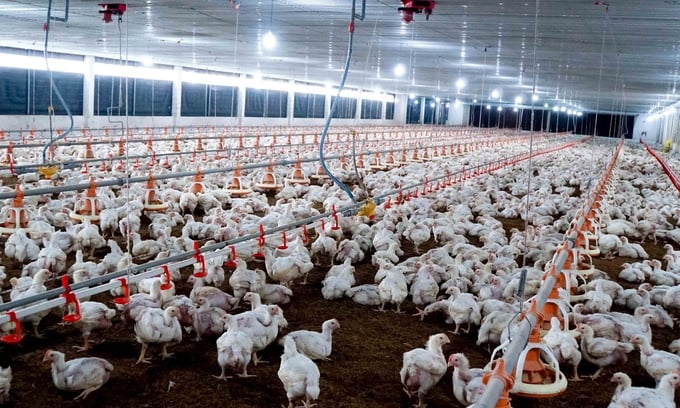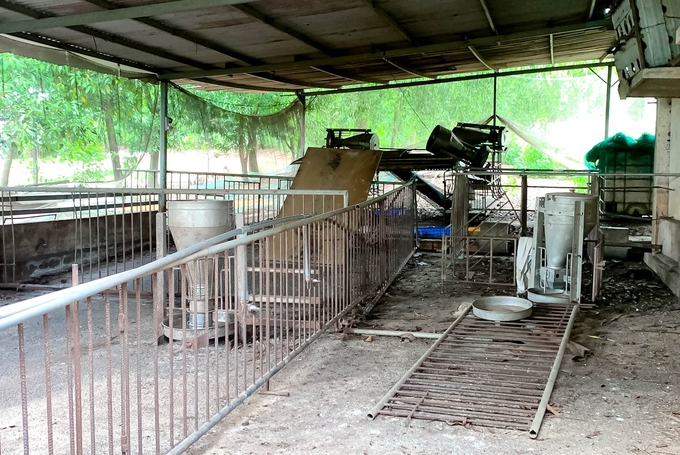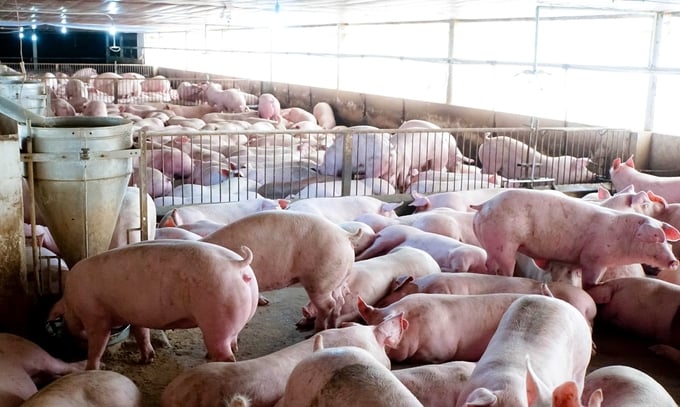June 5, 2025 | 06:36 GMT +7
June 5, 2025 | 06:36 GMT +7
Hotline: 0913.378.918
June 5, 2025 | 06:36 GMT +7
Hotline: 0913.378.918

An industrial chicken farm in Dong Nai. Photo: Le Binh.
Dong Nai has become the country's largest livestock producer in recent decades. Mr. Nguyen Tri Cong, chairman of the Dong Nai Livestock Production Association, stated that in 1960, the province of Bien Hoa, which merged with other provinces to form the present-day province of Dong Nai, was home to several large-scale industrial farms.
With a favorable climate and close proximity to Ho Chi Minh City, Vietnam's largest consumer market, as well as convenient road and waterway access, Dong Nai's livestock production industry quickly shifted to an industrial scale.
Dong Nai has attracted a number of large enterprises in animal feeds and breeding, such as C.P. Vietnam, Cargill Vietnam, De Heus, Japfa Vietnam, Woosung Vina, GreenFeed Vietnam, and Proconco, to invest in plants as a result of the early formation of industrial agriculture over a number of decades. As a result, the cost of delivery from production plants to the market has been reduced. Dong Nai's animal husbandry industry has been flourishing for decades, and the city has been known as the livestock capital of the nation.
According to data from the Dong Nai Department of Agriculture and Rural Development, Dong Nai will have approximately 2.5 million pigs and 26 million poultry by the end of 2022. Farm animals comprise more than 90 percent of the total herd. Nearly 62% of Dong Nai's total agricultural production value is accounted for by the livestock industry.

A small livestock facility in Dong Nai is on the verge of shutting down. Photo: Le Binh.
For decades, Dong Nai livestock has played a crucial role in supplying Ho Chi Minh City, the Southeast, and Dong Nai province with meat, and eggs, and in the province's overall economic growth. However, the large number of livestock facilities and the size of their populations contribute to numerous environmental issues.
Reorganizing livestock production towards quantity stability and environmental protection is the province of Dong Nai's top priority in light of this circumstance.
According to Mr. Tran Trong Toan, Deputy Director of the Dong Nai Department of Natural Resources and Environment, the inspection results indicate that there are still numerous deficiencies in planning, negative effects on the environment, and disease safety at the majority of inspected livestock facilities.
A wastewater treatment system is required for livestock facilities by law after biogas, settling basins, and reservoirs for treating wastewater, manure, etc.. Treated wastewater can be recirculated to clean stables or irrigate trees, or it can be discharged; refuse is collected, stored, composted, and sold. However, the majority of small and medium-sized businesses have not yet met this requirement.
The Dong Nai Department of Agriculture and Rural Development reports that domestic farming accounts for 9 to 10 percent of the province's total swine and poultry herd, but the number of establishments is large and widely dispersed. Dong Nai Provincial People's Committee is advancing toward replacing household livestock husbandry with linked, closed, and large-scale models in its livestock development strategy.
Mr. Tran Lam Sinh, Deputy Director of the Department of Agriculture and Rural Development in the province of Dong Nai, explained that this policy aims to both stabilize the livestock population and ensure environmental and disease safety. When developing large-scale, closed, high-tech pig and poultry husbandry, the objective is not only to maximize production but also to achieve international quality standards and tighter disease control.

A pig farm in Dong Nai. Photo: Le Binh.
The districts of Dinh Quan (1,000 facilities), Long Thanh (766 facilities), and Cam My (300 facilities) have the greatest concentration of the approximately 3,000 livestock facilities compelled to relocate or cease operations... Numerous breeding farms that must be relocated or shut down are like resting on a conflagration.
Mr. Nguyen Huu Thang's confined pig farm in Tan An commune, Vinh Cuu district, has maintained approximately 3,000 hogs for many years. Mr. Thang was recently informed that the pig farm must be relocated because it was not included in the original plan. Mr. Thang decided to leave his position after careful consideration.
Mr. Thang is currently preoccupied with the question of what the barn will be used for in the future. Assessing and accrediting a qualified agricultural production facility in Dong Nai typically takes between one and two years and costs tens to hundreds of millions of dong. This also causes producers direct difficulties.
The Dong Nai Livestock Association is also proposing and working with provincial leaders to solve this issue for livestock households. Mr. Le Van Quyet, Vice Chairman of Dong Nai Livestock Association, has more than 20 years of experience in the livestock industry. He wishes for a comprehensive discussion that places the sustainable interests of the people alongside environmental protection.
Translated by Linh Linh

(VAN) VAAS and numerous Vietnamese enterprises have signed cooperation agreements with Japanese partners to promote agricultural technology and trade connectivity.
/2025/05/29/5625-12-214801_567.jpg)
(VAN) Provincial mergers in the Mekong Delta promise to streamline administration, expand inter-provincial raw material areas, and foster close linkages in agricultural value chains, benefiting both businesses and cooperatives.

(VAN) Merging Mekong Delta provinces contributes to the expansion of agricultural raw material areas, addressing previous constraints caused by provincial boundaries. Additionally, this expansion will reduce costs and strengthen linkages between businesses, cooperatives, and farmers.
/2025/05/29/1043-2-153730_145.jpg)
(VAN) The Government's policy to merge provincial-level administrative units opens up major opportunities for the Mekong Delta region to reshape its agricultural development strategy toward large-scale production, effective regional linkages, and sustainability.

(VAN) The mutual export of agrifood products between the European Union (EU) and the United Kingdom (UK) must occur again without certification, border controls or other red tape. This was agreed at the UK-EU summit.
/2025/05/22/5121-2-173645_677.jpg)
(VAN) NBSAP Tracker identifies strengths and areas for improvement in the National Biodiversity Strategy, based on each region’s priorities and capacities.

(VAN) The draft amendment to the Circular on rice export trading stipulates a periodic reporting regime for rice exporting enterprises.